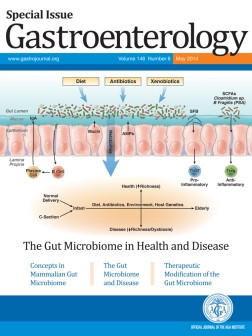Gastroenterology is proud to present a special issue devoted to ‘The Gut Microbiome in Health and Disease’.
The human body contains over 10 times more microbial cells than human cells. This microbiome (the commensal, symbiotic, and pathogenic microorganisms that share our body space) maintains the health and function of many tissues, and its disruption contributes to the pathogenesis of many diseases. Gastroenterology has therefore devoted an entire issue—14 review and perspective articles—to this rapidly developing area of research.
In an introduction to the special issue, editors Chung Owyang and Gary Wu explain the particular importance of the most densely populated and diverse of our microbial communities, the intestinal microbiome. Intestinal microorganisms interact with almost all body systems (immune, nervous, metabolic, etc). The effectiveness of fecal microbiota transplantation in the treatment of refractory Clostridium difficile infection has demonstrated how modification of the intestinal microbiome can be used to treat gastrointestinal disorders.
Articles published in this special issue cover the basic concepts of the mammalian gut microbiome and its potential roles in development of various disorders including inflammatory bowel diseases, cancer, and liver disease. Others discuss how the microbiome might be modified to maintain health or treat disease, such as through transplantation of fecal microbiota or with diet and pre or probiotics. Articles cover the latest technologies used to characterize the composition of the microbiome and its metabolic products, as well as the activities of nonbacterial organisms, such as the virome and mycobiome.
This issue is a must-read for anyone interested in learning more about how our microbiota contributes to our health and disease.



a very interesting article, thanks a lot!